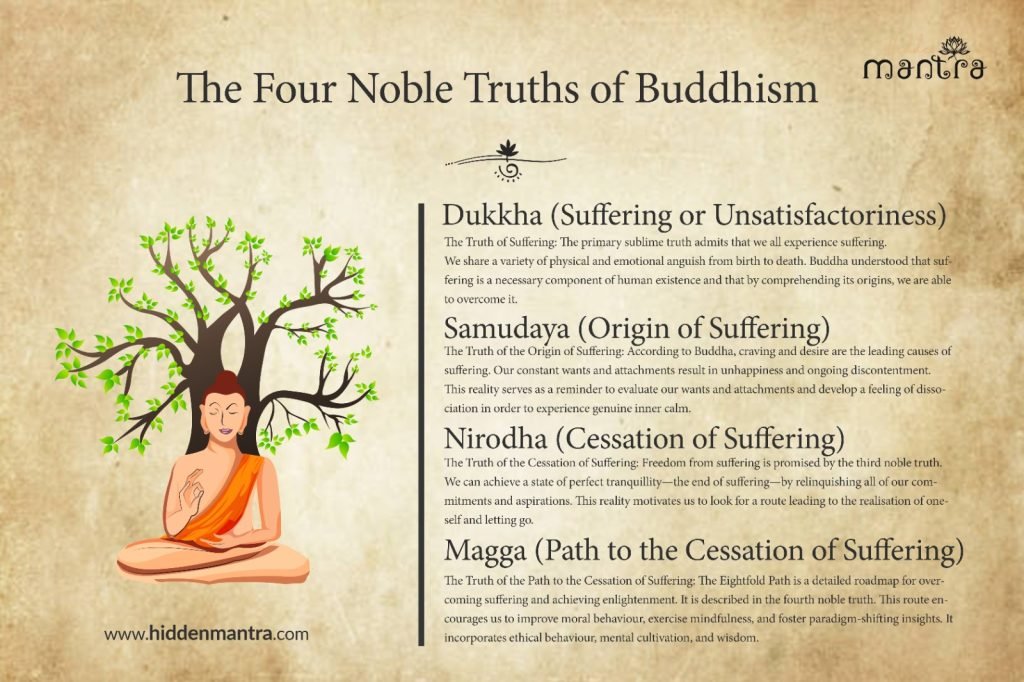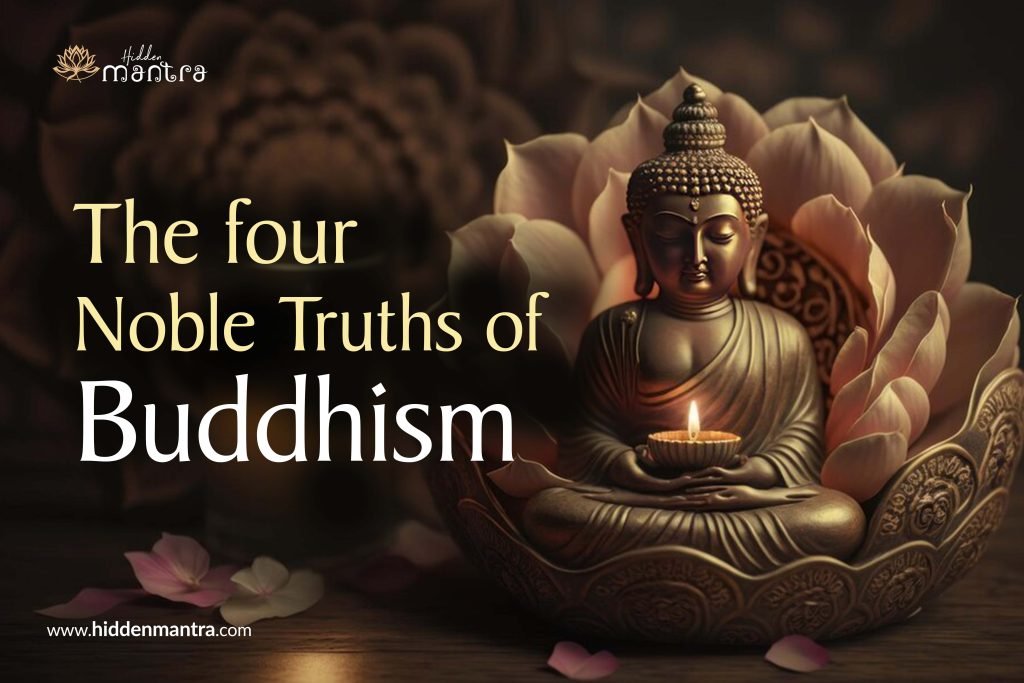Buddhism- the oldest and biggest religion has its origin in India, which goes back nearly 2,500 years. A Buddhist strongly believes that nirvana or enlightenment might be achieved via meditation, spiritual and physical hard work and good behaviour. In addition, he believes that pain is a part of human existence.
Buddhism has captured the hearts of billions of people all around the world with its profound philosophy and spiritual legacy. In this blog, we explore the essential ideas and practices of Buddha. Buddhists think as we delve deeply into its core teachings. Come along on a transforming trip as we learn the true meaning of Buddhism and the way to inner peace. Here are some of the lessons preached by Buddha in the simplest way from Hidden Mantra for you in case you are on the way to enlightenment.
Buddhism is a spiritual path that leads to awareness of the nature of reality as it truly is. Buddhists adhere to such meditation as is way to transform oneself so that you might grow in awareness, kindness, and knowledge, For all individuals who aspire to follow a path that ultimately leads to Enlightenment or Buddhahood, the understanding acquired throughout the Buddhist tradition for thousands of years has provided an unmatched resource.
The nature of reality is seen by an enlightened being to be totally plain, precisely as it is, and they behave fully and naturally in line with that view. This represents the end of suffering for anyone who reaches it and is the objective of the Buddhist spiritual path. Buddhists believe that there exists a sequence of restoration into numerous bodies. It is associated with Karma, which refers to how the good and bad conduct of an individual’s earlier life could impact him in the current life.
The Four Noble Truths, which Gautama Buddha taught as its cornerstone, are at the core of Buddhism. These principles serve as the cornerstone of Buddhist philosophy and provide profound insights into the causes of suffering and their alleviation. Let’s examine each of these statements separately. Here Hidden Mantra introduces the Four Noble Truths of Buddhism.
The Four Noble Truths of Buddhism
The four Noble Truths are the core of Buddha’s teachings although they leave a lot out. They are the reality of suffering’s resolution, the truth of suffering’s case, the truth of the way to suffering’s resolution and the truth of pain. In plainer terms, pain has a cause, an end, and a reason that will bring about that end.
The idea of suffering is meant to communicate a pragmatic attitude that engages with the world like it is and works to make it better, not a pessimistic one. Even though it is not refused, the concept of pleasure is received as transient. What is essentially an endless hunger can only be continued by the pursuit of pleasure. The same reasoning disproves any notion of happiness.
The only things that are inevitable and certain in the end are ageing, illness, and death. Irrespective of mental or physical character, the Four Noble Truths are considered a standby plan for conveying the agony that humans experience. Let’s start with the four Noble Truths with Hidden Mantra. The Four Noble Truths of Buddhism are given below
- Dukkha (Suffering or Unsatisfactoriness)
- Samudaya (Origin of Suffering)
- Nirodha (Cessation of Suffering)
- Magga (Path to the Cessation of Suffering)

1. Dukkha (Suffering or Unsatisfactoriness)
The Truth of Suffering: The primary sublime truth admits that we all experience suffering. We share a variety of physical and emotional anguish from birth to death. Buddha understood that suffering is a necessary component of human existence and that by comprehending its origins, we are able to overcome it.
2. Samudaya (Origin of Suffering)
The Truth of the Origin of Suffering: According to Buddha, craving and desire are the leading causes of suffering. Our constant wants and attachments result in unhappiness and ongoing discontentment. This reality serves as a reminder to evaluate our wants and attachments and develop a feeling of dissociation in order to experience genuine inner calm.
3. Nirodha (Cessation of Suffering)
The Truth of the Cessation of Suffering: Freedom from suffering is promised by the third noble truth. We can achieve a state of perfect tranquillity—the end of suffering—by relinquishing all of our commitments and aspirations. This reality motivates us to look for a route leading to the realisation of oneself and letting go.
4. Magga (Path to the Cessation of Suffering)
The Truth of the Path to the Cessation of Suffering: The Eightfold Path is a detailed roadmap for overcoming suffering and achieving enlightenment. It is described in the fourth noble truth. This route encourages us to improve moral behaviour, exercise mindfulness, and foster paradigm-shifting insights. It incorporates ethical behaviour, mental cultivation, and wisdom.
The Four Noble Truths: A Path to Peace
The Four Noble Truths are the foundation of Buddhism, providing a clear and practical roadmap to information suffering and achieving lasting peace of thought. These truths, determined with the aid of Siddhartha Gautama, the Buddha himself, provide a framework for navigating the inevitable demanding situations of lifestyles.
The Four Noble Truths:
The Dukkha, or Noble Truth of Suffering: Life is full of constant change and can be unsatisfying. Moments of happiness are fleeting, and clinging to them leads to disappointment.
The Samudaya, or Noble Truth of the Cause of Suffering: Our suffering comes from always wanting things we don’t have and rejecting things we don’t like.
The Nirodha, or Noble Truth of the End of Suffering: We can end our suffering by achieving Nirvana, a state of peace where we let go of desires and attachments.
The Marga, or Noble Truth of the Path to the End of Suffering: The Noble Eightfold Path guides us to end suffering through right actions, mental training, and mindfulness.
Benefits of Studying the Four Noble Truths of Buddhism
Understanding the Noble Truths gives a large number of blessings, which include:
Increased self-recognition: By acknowledging struggling, we emerge as extra aware of the foundational causes of our dissatisfaction with lifestyles.
Reduced emotional reactivity: recognizing the impermanent nature of things permits us to let go of attachment and emotional extremes.
Greater compassion: accepting the universality of struggling fosters empathy and knowledge for others.
Enhanced decision-making: Understanding the purpose of struggling enables us to make alternatives that promote our well-being.
Improved intellectual well-being: Cultivating practices outlined inside the Noble Eightfold Path foster internal peace and reduce stress and anxiety.
Applying Noble Truths in Daily Life: Following the Noble Truths can bring profound adjustments to your daily life.
Mindfulness: By training mindfulness, we become more aware of our mind, feelings, and physical sensations without judgment. This allows us to look at cravings as they arise and choose no longer to act upon them.
Acceptance: We learn how to be given the impermanent nature of existence, allowing us to experience joy without clinging and navigate demanding situations with greater resilience.
Gratitude: Shifting awareness from what we lack to what we have fosters a sense of gratitude for the easy joys in life.
Compassion: Recognizing suffering in ourselves and others fosters kindness and expertise in our interactions.
Why are the Four Noble Truths critical?
The significance of the Noble Truths lies in their potential to provide a roadmap for lasting happiness.
Universality: They deal with an essential human experience—suffering—and offer a solution that transcends cultural and religious obstacles.
Practicality: The Noble Truths provide a clear and actionable framework for living a more non-violent and pleasurable existence.
Empowerment: They empower us to take responsibility for our happiness and well-being in place of blaming outside situations.
By gaining knowledge and applying the Four Noble Truths, we can cultivate a more non-violent and meaningful lifestyle, freeing ourselves from the grip of struggling.
Conclusion
In conclusion, Buddhism addresses the universal human search for inner peace, pleasure, and meaning. People can begin a transforming path through the realisation of themselves and liberation from suffering by accepting the Four Noble Truths and adhering to the Eightfold Path. May the Buddhist teachings illuminate our ways and unleash the inherent goodness that exists in each of us.









11 Responses